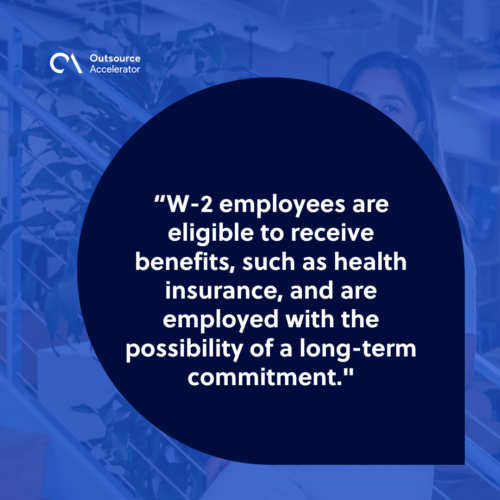1099 vs. W-2 employee: What’s the difference?

A company can employ a 1099 employee or a W-2 employee depending on what is needed and what can be offered to them.
Either one can help your company accomplish essential tasks but are different in terms of commitment and compensation.
Learn more about these two types of employees in this article.
What is a 1099 employee?
A 1099 employee refers to an employee who is hired based on a specific task to be accomplished within a certain amount of time.
The term 1099 comes from their tax form, which records the income for the year without taxes withheld.
In other words, these are not full-time employees hired for long-term positions. Instead, this title is given to short-term employees who are paid for specific tasks.
People who fall under this category include:
- Self-employed workers
- Gig workers
- Freelancers
- Independent contractors
- Consultants

Benefits of hiring a 1099 employee
Hiring a 1099 employee has several benefits:
Cost-effective
For one, they are a lot cheaper to hire than full-time employees since there is no long-term commitment needed.
Companies do not have to worry about shelling out extra money for benefits or insurance and can simply pay the employees what they are due.
Diverse skill set
Another advantage is that 1099 employees bring unique skills to the table. Despite having limited employment, they still bring valuable skills essential for short-term projects.
Disadvantages of hiring a 1099 employee
On the other hand, hiring 1099 employees has its drawbacks.
Less control
Employers may have less control over how their employees do their work. This means that 1099 employees have their own methods, tools, and ways of how they want to do the job.
No required benefits
Another disadvantage is employees have no insurance or statutory benefits since the company does not provide these.
While it may be good to save up on these costs, the business may be held liable for work-related injuries or accidents.
What is a W-2 employee?
If 1099 employees have no long-term commitments, W-2 employees are the opposite.
These are employees hired by a company to fulfill a specific role and are paid by the hour, monthly, or annually. They are directly on the company’s payroll.
Similarly, the term W-2 comes from Form W-2, which keeps track of employees’ incomes and the taxes withheld.
W-2 employees are eligible to receive benefits, such as health insurance, and are employed with the possibility of a long-term commitment.

Benefits of hiring a W-2 employee
Hiring W-2 employees brings in the following advantages:
Maintain control
Employers of W-2 employees have more control over the work they do. They provide training, business processes, and company policies.
Commitment to work
W-2 employees are more committed to the company because of things like a steady income and a compensation plan.
Having committed employees leads to increased loyalty, which positively impacts company operations, productivity, and morale.
Disadvantages of hiring a W-2 employee
The main disadvantage of W-2 employees is their cost. It costs more to manage them as you have to take into account factors like training, company-provided tools and software, and monthly salaries.
The company is also responsible for paying their share of Social Security and Medicare taxes.
1099 vs. W-2 employee: Key differences
1099 and W-2 employees differ in many ways. Let’s take a look at how they compare in terms of the following factors:
Nature of work
When it comes to the nature of work, both employees bring unique skills to the company.
The main difference is that 1099 employees work for a limited time before they move on to the next company. Meanwhile, W-2 employees are hired full-time or part-time with potential long-term commitment.
Taxes
Companies do not have to withhold taxes from 1099 employees. The employees themselves are responsible for reporting their own taxes.
On the contrary, it is the company’s responsibility to withhold taxes from W-2 employees, as well as deposit tax for Social Security and Medicare.
Payment
1099 employees generally dictate their own rates and are paid per project that they are hired for and are not paid until the next one.
This is in contrast to a W-2 employee’s payment, as they are paid a monthly or annual salary. They generally receive payments every two weeks.
Employment length
For 1099 employees, their employment length depends on the project or task for which they are hired. For example, they could be hired for a project that spans six months only.
Meanwhile, the length of employment for W-2 employees is indefinite, meaning they can work for as long as possible until resignation or termination.
1099 vs. W-2 Employee: Which should you hire?
1099 employees are best if you need specialized tasks for a certain project. These employees are best for temporary or short-term projects.
Additionally, 1099 employees are ideal if you do not have the budget to accommodate a long-term employee and the benefits they are entitled to.
On the other hand, if you have the budget to accommodate monthly salaries and government benefits and are looking for full-time commitment to your company, a W-2 employee is ideal.







 Independent
Independent




